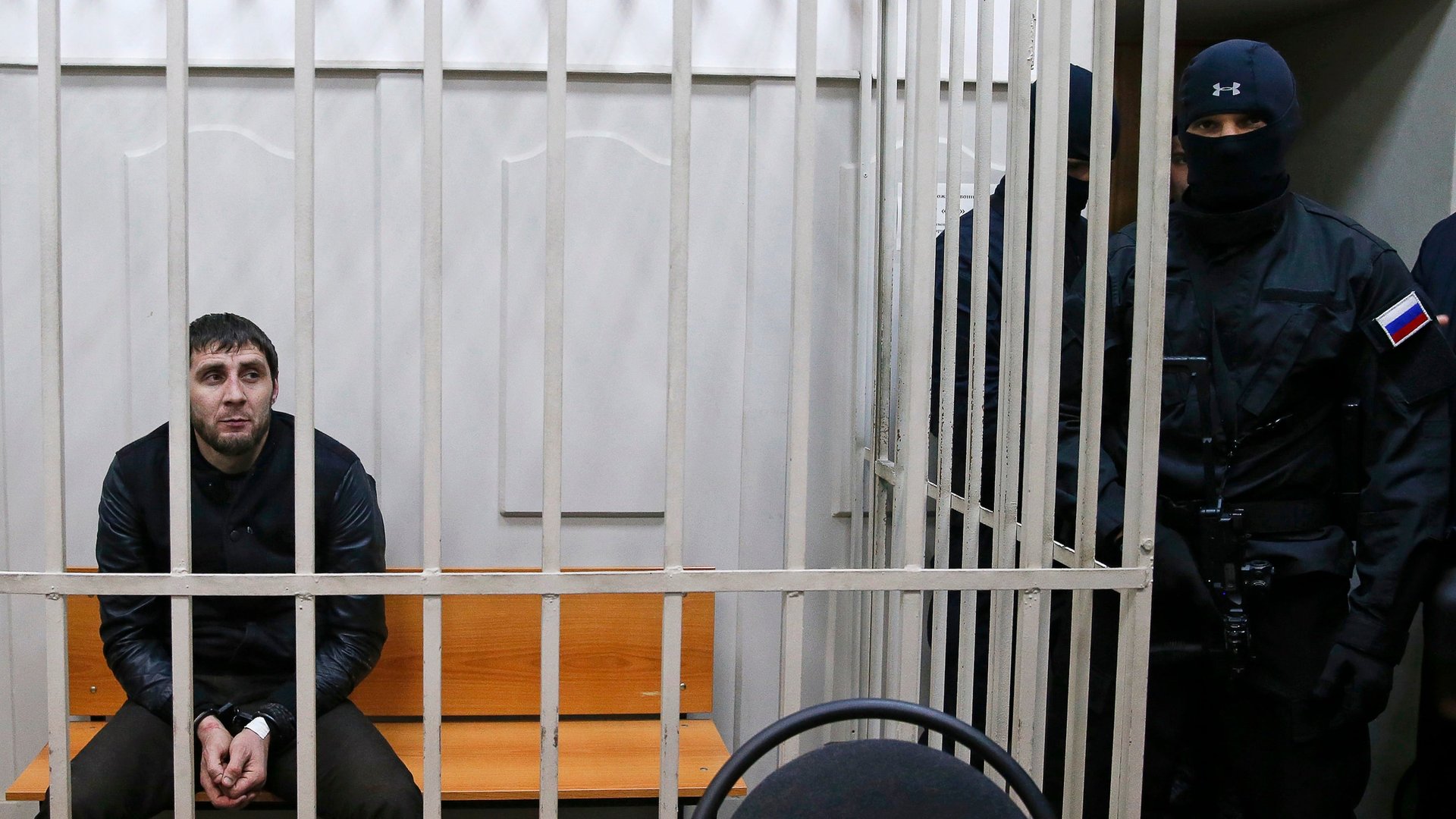Why it’s so easy for Russians to believe a Chechen killed Boris Nemtsov
It’s called the “Chechen trail,” and it’s frighteningly simple for Russian prosecutors to lay: In the wake of any given Russian political crisis, identify the inciting incident, isolate the incident, blame the incident on a Chechen.


It’s called the “Chechen trail,” and it’s frighteningly simple for Russian prosecutors to lay: In the wake of any given Russian political crisis, identify the inciting incident, isolate the incident, blame the incident on a Chechen.
To explain the recent murder of Russian opposition politician Boris Nemtsov, prosecutors have accused Chechen suspect Zaur Dadayev of seeking vengeance after Nemtsov publicly defended French magazine Charlie Hébdo, whose cartoons mock the prophet Mohammed. On Mar. 8, Russian officials stated that Dadayev had admitted to Nemtsov’s murder; he has since retracted, claiming that law enforcement officers forced the confession.
It’s not the first time Chechens have been accused in controversial mystery killings—in 2006, Chechen suspects were tried (then acquitted) for the murder of Forbes Russia editor Paul Khlebnikov, while others were convicted in the same year for killing journalist Anna Politkovskaya—both, like Nemtsov, outspoken critics of Putinism.
Chechnya, the formerly separatist federal republic located in the north Caucasus, has been Russia’s fall man for the better part of two centuries, in part thanks to deep-seated interethnic animosities that seem to flare up every five years or so. Although Chechens have been largely unpopular in Russia since the mostly Muslim region was dragged, kicking and screaming, into the Russian imperial fold in 1859, the real roots of this disfavor lie in two points in recent history:
First, there was the 1941 Nazi invasion of the Soviet Union. Some Chechens took this as an opportunity to throw off the yoke of Russian rule—a collaborationism borne out of anti-imperial angst, not unlike that which played out simultaneously in Ukraine. In retaliation, Moscow later dissolved the Chechen-Ingush Soviet Republic and expelled 500,000 of its residents to remote resettlement camps in Central Asia. Tens of thousands perished in what the Russians call the Chechevitsa, the Chechens Aardax, or “Operation Lentil”—the Caucasus’s equivalent of the Trail of Tears—which the European Parliament defined as an act of genocide in 2004.
These wounds were still fresh in 1991, when the independent Chechen Republic of Ichkeria was declared. Ethnic Russians were chased out en masse. Soon after, president Boris Yeltsin ordered a military invasion and occupation of Grozny, the Chechen capital, in 1994. Another two years of bloody insurgency ensued, before the inconclusive 1996 Khasavyurt Accord was signed by Russia’s then-security chief, Alexander Lebed, and Chechnya’s separatist president, Aslan Maskhadov.
Russian tanks rolled into Chechnya once more in 1999, when a Chechen Islamist group known as the Islamic International Brigade (IIB) invaded the neighboring federal republic of Dagestan. Within a year, Russian troops razed Grozny, and effectively suspended home rule for Chechens. In 2003, Chechnya was formally constituted as a subject of the Russian Federation. A period of sporadic insurgency followed, including the Beslan school massacre (2004), the 2010 Moscow Metro bombings, and a 2011 suicide bombing at Domodedovo International Airport.
Today in Russia, according to a 2011 public opinion poll conducted by the Levada Center, 24% of Russians believed migrants specifically from the North Caucasus should be banned from living in northern Russian cities, and 32% believed the Moscow Metro bombings to be a specific act of “vengeance” for Russian occupation of the North Caucasus. Less the one percent felt any sort of guilt toward North Caucasian peoples, while 38% reported annoyance, dislike, or fear of the North Caucasus republics. An equal proportion wants all Chechens summarily kicked out of the federation.
People of the Caucasus are seen as inherently violent, superstitious and honor-bound in Russia, and—in addition to historical enmity—this is due to a misunderstanding of the Chechen tradition of adat.
Adat, distilled to its most basic form, is a cultural mandate for vengeance. Generally, it centers on blood feuds—there’s a murder in a Chechen village, perhaps due to a disagreement gone awry, and the onus of carrying out vendetta falls to the family of the slain. But contrary to the Chechen stereotype of the aimless berserker, traditions like adat are meant to force imminently violent actors into pause for thought. The ramifications of one’s actions are more clearly mapped out. “It’s very hard for one Chechen to kill another,” a former Chechen separatist fighter told The Chicago Tribune in 1996. “It means a blood vendetta. The killing must be avenged.”
Though this version of “an eye for an eye,” by definition, cannot be committed against a non-Chechen, that hasn’t stopped the Russian press from speculating as to the role of zealous Chechen nationalism, coupled with Islamist fervor, in Nemtsov’s death. The word “revenge” is conspicuously sprinkled throughout Russian news reports of Dadayev’s arrest.
Foisting blame for Nemtsov’s murder onto a Chechen plays right into Russocentric notions of the federation’s peripheral nations, particularly those of Muslim extraction. “Investigators’ nonsensical theory about Islamist motives in Nemtsov’s killing suits the Kremlin and takes Putin out of the firing line,” said Ilya Yashin, co-director of Nemtsov’s liberal opposition party, in an interview with Reuters.
“The Chechens once again appear in the eyes of the world as ‘fanatical Islamists’ and ‘ruthless killers,’” exiled Chechen separatist leader Akhmed Zakayev said in an interview with the UK edition of the International Business Times. “This is in line with the general Russian propaganda that is trying to portray us as defective people prone to fanaticism and crime and who, therefore, are unable to build their peaceful, prosperous independent nation.”
Perpetuating a negative narrative about the nation that has repeatedly sought independence would indeed have an added benefit for Putin’s territorially-ambitous government. This highlights an interesting hypocrisy undermining Putin’s foreign policy. Though the Russian leader, eager to curry favor among fellow BRICS leaders, loudly and frequently derides the global imperialist structures of centuries past, he forgets that he leads its largest remaining vestige—the Russian Federation itself.